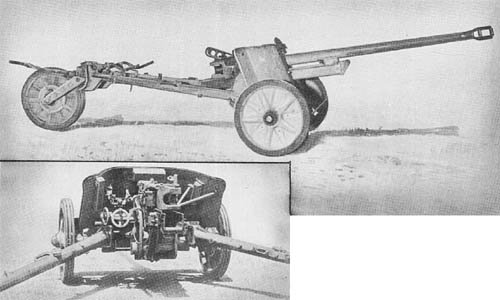
The 5 cm Pak 38, introduced during the 1941 campaigns in Greece and Egypt, was developed to combat the more heavily armored vehicles of the Allies.
The gun has a barrel of monobloc construction, threaded at the muzzle for attaching a two-baffled muzzle brake. Because of the position of the breech-operating cam, a minimum length of recoil of approximately 18 1/2 inches is needed to operate the semi-automatic breech mechanism which is of the sliding horizontal block type. The recoil recuperator system is hydropneumatic.
The carriage, constructed of welded steel, is mounted on metal disk wheels with solid rubber tires. Torsion bar suspension is automatically locked when the tubular trails are spread. A 5 mm spaced armor shield and single apron protect the gun crew. The left side of the shield has a sighting port.
There are five types of ammunition fired from the Pak 38: an armor-piercing capped, high-explosive projectile; a high-explosive shell; an A.P.-H.E. (uncapped) shell; a tungsten carbide core arrowhead type projectile (A.P. 40), and a stick grenade similar to the 3.7 cm grenade described on page 306.
SPECIFICATIONS
| Caliber | 50 mm (1.97 ins.) | |||
| Weight (complete) | 2,015 lbs. (approx.) | |||
| Length of gun (overall) | 15 ft., 3 ins. | |||
| Length of barrel (overall) | 9 ft., 3 ins. | |||
| Width C-C | 5 ft., 1 in. | |||
| Carriage | Welded steel w/solid rubber tires and tubular trails | |||
| Breech mechanism | Horizontal sliding block | |||
| Recoil mechanism | Hydropneumatic | |||
| Rifling | 20 lands & grooves; right-hand twist | |||
| Muzzle velocity | ||||
| A.P.C.-H.E. | 4.5 lb.—2600 f/s | |||
| H.E. | 4.0 lb.-1800 f/s | |||
| Elevation | 22° | |||
| Depression | -4° | |||
| Traverse | 80° | |||
| Sights | Straight tube telescope | |||
| Ammunition | A.P.; A.P.C.; H.E.; A.P. 40 | |||
| Penetration | ||||
| Range | Thickness of armor in mm | ||||
| Yards | 30° | Normal | |||
| 500 | 2.6 | 3.1 | |||
| 700 | 2.4 | 2.9 | |||
| 1000 | 2.2 | 2.6 | |||
| 1200 | 2.0 | 2.5 | |||
German: p. 126 (June 1, 1945)